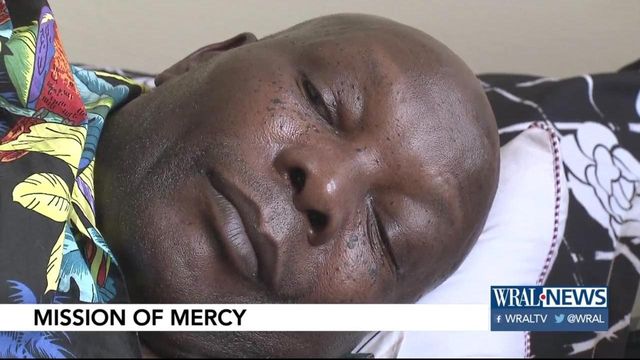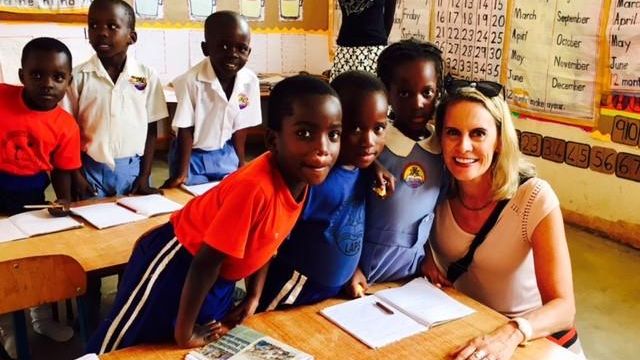Mission of Mercy: Duke neurosurgeons trek to Africa to train, treat the sick
The night before their 7,300-mile trip to Kampala, Uganda the medical team from Duke packed suitcases full of supplies and a big dose of courage. The team traveled to Africa to provide life-saving procedures for Ugandans in need.
Posted — UpdatedThe night before their 7,300-mile trip to Kampala, Uganda, the medical team from Duke University Hospital packed suitcases full of supplies and a big dose of courage.
"I wanted to go on the trip to remember why I'm a nurse, (which is) to be able to help people, teach others and care for people," said Jen Massengil, when asked why she was traveling thousands of miles to treat African patients in need.
For 10 years, members of the Duke Global Neurosurgery and Neuroscience group have taken a medical team to hospitals in Uganda twice a year to establish and maintain neurosurgery programs. The program was created and is led by Dr. Michael Haglund, a Duke neurosurgeon and professor.
"When people step on and step off the Earth, my belief is that God is in charge of that," he said. "But I feel like we have a say in" how long we can prolong our lives.
Haglund said his team has helped to modernize the Ugandans approach to medicine.
"Before we came in 2007, they used to stop (bleeding) with a little piece of gauze that they would lay on (a patient's) brain and then wait to see if the bleeding stopped and then pull it off, which is like 1930s technology," he said.
Uganda currently has nine neurosurgeons thanks to the financial support for education provided by the Duke Global Neurosurgery and Neuroscience program. Their goal is to increase the number of surgeons to 25 by 2025. Dr. Oscar Obiga was one of the first neurosurgeons in Uganda to receive his medical education and training through DGNN.
"It was life changing," Obiga said. "I used to pray when I was still in high school that someone would come along and teach me how to become a neurosurgeon. When Haglund came, I think it was like a godsend."
On the Duke team's most recent trip, one of their top priorities was outfitting Mengo Hospital with tons of surplus medical equipment and supplies needed to create a neurosurgery program.
"Like many of the trips, we're going into a place we've never been, so we won't know until we get there what we're in for (or) what will happen," said Dave Gleason, a certified registered nurse anesthetist.
The Duke team works out of Mengo Hospital, which accepts patients from all over the country. The facility, which is 120 years old, has a solid reputation. Haglund approached Dr. Rose Mutumba, the Mengo Hospital director, about creating the special unit.
"We have never thought of actually having a neurosurgical department in this hospital," Mutumba said. "We thought it would be too difficult (and) too complex, so we had never thought of it."
Most people in Uganda, a developing country that is home to 37 million people, can barely afford housing or food, let alone health care, which means medical problems often go undetected and untreated for years.
"There are people who wait six months for neurosurgery that they couldn't get otherwise," said Bobby Gramer, a medical student who is part of the Duke team. "They're up against losing motor function, language and being bed confined."
Florence Nsubuga's husband, Joseph, has a massive brain tumor that leaves him angry and agitated at times.
"I didn't know what was wrong with him," she said. "Can you imagine getting married to someone, and then, after some years, you can't imagine who you are living with?"
Abdul Marsal is another patient with a large brain tumor. He is unable to work and has trouble speaking.
"The problem is my head," he says. "Things are changing."
Marsal's family knew for the past five years that something has been wrong with his health, but they did not have enough money to pay for surgery.
"It is very expensive in Uganda," said his wife, Amina. "We really cannot manage."
When the needy Ugandan patients received word that the team from Duke was coming, they likened it to a miracle.
"I'm very happy to see the doctors from America!" said Mustafa Kisayile.
His wife, Miriam Kisayile, agreed.
"I'm very happy," she said. "I'm very excited because my husband (is) feeling the pain so much."
• Credits
Copyright 2024 by Capitol Broadcasting Company. All rights reserved. This material may not be published, broadcast, rewritten or redistributed.






